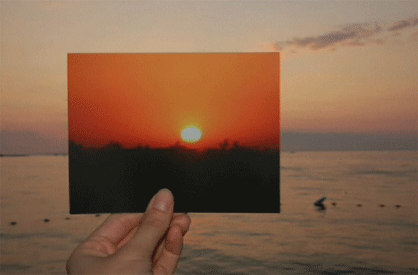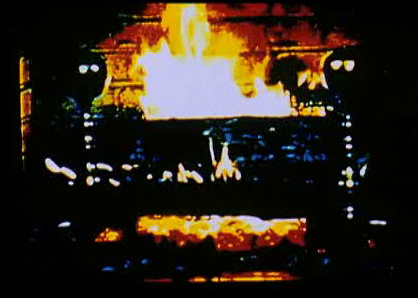

Lisa Oppenheim is interested in how the present viewer sees media of the past, and to study this she takes materials from archives and transforms them with editing effects that distill her interpretation of how an image’s meaning changes over time. For a show at tank.tv, on view through July 21, Oppenheim has revealed her sources and processes in texts accompanying five of her moving-image works. E-M-P-I-R-E reconstructs Andy Warhol’s eight-hour film of the same title using a single 100-foot roll of 16mm color film. “Unlike Warhol’s endurance test of extended filmic boredom, this version uses the language of structuralist ‘flicker’ films of the late 60’s and 70’s,” Brian O’Connell writes in an essay excerpted on tank.tv. He goes on to inform us that the rhythm of the flickering Empire State Buildings spells out “E-M-P-I-R-E” in Morse code—a system as obsolete as 16mm film. Explanations like these never hurt, but Oppenheim’s work is stronger when the transformation of an image over time is a compelling sight in itself. The two channels in Story, Study, Print (2005) juxtapose children’s posters used in predominantly African-American schools in the 1970s with a disconnected sequence of still and moving images; here, chance and obscurity force viewers to form their own associative links rather than relying on a statement to decode meaning. In Yule Log, 2008, a soothing image of a fireplace at Christmastime deteriorates through several repetitions, each one a 16mm copy of the last, while The Sun Is Always Setting Somewhere Else (2006) is a slide show where each frame shows a hand holding snapshots of a sunset up to a live sunset as the sun sinks behind the horizon. Each of these two works has a politically charged backstory, but the immediate effect comes from the artist’s coolly detached manipulation of tepidly sentimental imagery. On Thursday, at Brooklyn’s K&M Bar, in conjunction with the week-long events series “the invited (cordially uninvited),” Oppenheim will reflect on her working process by presenting two films, Adynata by Leslie Thornton and Zorns Lemma by Hollis Frampton.

